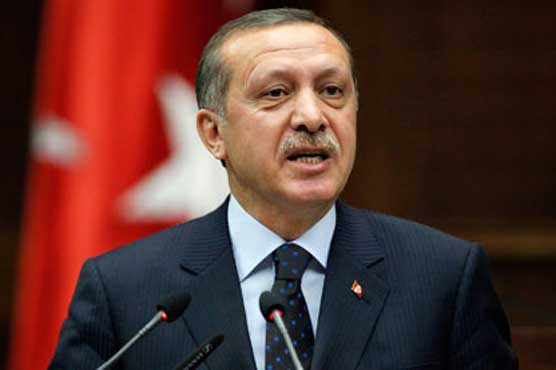Turkey's political powerhouse AKP down but far from out

Prime Minister Recep Tayyip Erdogan and his AKP are now embroiled in their most damaging crisis.
ISTANBUL (AFP) - Turkish student Elif has just turned 19 and will be voting for the first time as the country holds a pivotal series of upcoming elections in the face of deep political strife.
But she says she won t be casting any ballots for the Justice and Development Party (AKP), the Islamic-rooted movement that has enjoyed almost absolute power since it swept to a landslide victory in 2002, barely a year after its creation.
"The country is a mess now, who can you trust? It won t be AKP but I don t know who else," the English-language student told AFP at a cafe near Istanbul s Taksim Square, not wanting to give her full name.
Prime Minister Recep Tayyip Erdogan and his AKP are now embroiled in their most damaging crisis, struggling to contain the political and economic fallout from a corruption scandal that erupted six weeks ago.
The probe has implicated several government allies accused of money laundering, bribery and gold smuggling, casting a shadow over Erdogan s pledge to make Turkey a corruption-free economic power.
Critics say the AKP response -- mass purges of the police and judiciary -- has exposed Erdogan s authoritarian streak and threatened democracy in Turkey as it seeks to win EU membership.
The tensions have sent the lira diving to record lows and jeopardised government economic targets.
But analysts say the party, whose initials AK mean "clean" or "pure" in Turkish, is far from finished and remains the only dominant force in Turkish politics.
Its future hinges not only on how it fares in local elections in March, but also the ambitions of its charismatic but pugnacious 59-year-old leader.
The turmoil has exposed rifts in the AKP power base -- notably Erdogan s feud with exiled Islamic preacher Fethullah Gulen, a longtime ally whose supporters the premier now accuses of treachery and waging a "dirty" conspiracy to overthrow him.
Without Erdogan AKP could implode
===================================
The party itself, a broad coalition of the centre-right, Islamists and business interests, has faced a wave of defections since the scandal broke.
At least six lawmakers and hundreds of local members have jumped ship over the party s refusal to brook any dissent, some complaining about what they see as Erdogan s "imperious" and "arrogant" style.
"The prime minister sees the party as his own farm," charged former AKP lawmaker Erdal Kalkan, who resigned last month.
But Soner Cagaptay of the Washington Institute for Near East Policy warned that without a strong leader, the AKP would simply "implode".
"An Erdogan-led AKP stays together to win elections, and everyone is rewarded. Conversely, challenges to Erdogan would cascade into multiple fractures, resulting in a scrabble of weak parties and guaranteed disaster for the entire coalition," he said in a report.
The first test is the March 30 local elections, followed by an August presidential ballot and legislative polls in 2015.
A January survey found AKP support had dipped two percentage points in a month, and media reports suggested party insiders were becoming worried about its performance in March.
But it still enjoys a formidable lead of 42 percent against 29 percent for the opposition Republican People s Party (CHP), with support particularly among religious conservatives and in rural areas.
"We think Erdogan has not lost any ground because he has quite successfully established the perception that this is a smear operation against his rule and emerged the victim," sociologist Ali Kose, founder of YESO-DER (New Sociology Association), said of the corruption probe.
The fact that the feud between Erdogan and the unelected US-based Gulen is the key powerplay in such a highly charged election year also underscores the absence of a real opposition.
"This is an asymmetric war: Erdogan is the leader of a political party," said Nihat Ali Ozcan of the private TOBB university.
"But the Gulen movement is not transparent and the boundaries of this structure are not very clear."
The AKP was founded in 2001 from a banned Islamic party and went on to win three elections, each time with a greater share of the vote.
It rejects claims of an Islamist agenda, describing its ideology as one of "conservative democracy" that has brought stability after years of rocky coalitions and coups, and strong economic growth built in part on ambitious construction and transport projects.
But rights groups and opponents say the true face of Erdogan and the party surfaced in June, with a heavy-handed response to a wave of mass anti-government protests.
Human Rights Watch said in its annual report that the AKP has demonstrated "a growing intolerance of political opposition, public protest, and critical media".
Critics says it is threatening democratic gains by trying to impose its own Islamic-leaning social policies and greater government controls on the media, the Internet and even medics.
"Erdogan is speaking like an apostle of democracy in Brussels, but acting like a would-be dictator in Ankara," said CHP deputy leader Umut Oran.
Cagaptay said the future of the AKP -- and ultimately Turkey -- depends on whether Erdogan secures enough support to enable him to change the constitution and take over a presidency transformed into a powerful US-style executive post.
But for now, he said: "What is clear is that the AKP is going to win. The question is by how much."
txw/jhb
AFP
270518 GMT JAN 14


